
The Creative Process · Arts, Culture & Society: Books, Film, Music, TV, Art, Writing, Creativity, Education, Environment, Theatre, Dance, LGBTQ, Climate Change, Social Justice, Spirituality, Feminism, Tech, Sustainability
by Mia Funk
- Episodes
- About
Podcast episodes
Season 15
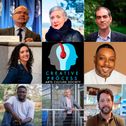
 In this time of rapid technological change, how do we hold onto our humanity? How do stories, traditions, and community help us find meaning in loss and face an uncertain future? How can science, art, and spirituality open new pathways to understanding ourselves and the human experience? PAUL SHRIVASTAVA (Co-President, The Club of Rome) discusses the need for a holistic, eco-civilizational future, emphasizing that science, technology, and economics are important but not the whole picture. He shares the importance of embodied, emotional, and spiritual learning as essential to evolving human consciousness in a technologically dominated world. BAYO AKOMOLAFE (Philosopher, Founder of Emergence Network) shares a story about the loss of his father and how it forced him to mature quickly and become the breadwinner for his family. He reflects on the lessons learned from his children, especially his autistic son, who teaches him about grace, possibility, and futurity. MICHEL FORST (Human Rights Advocate & the UN Special Rapporteur on Environmental Defenders) explores how theology and meditation serve as ongoing sources of inspiration, shaping his values and career choices in human rights advocacy. DR. GUY LESCHZINER (Neurologist, Author of The Nocturnal Brain) on the concept of free will, suggesting that much of what we do is influenced by factors beyond our control. He discusses the importance of striving to make the world better, the role of sleep and dreams in memory and emotional processing, and the future of education. EIREN CAFFALL (Author of All the Water in the World) highlights the importance of preserving knowledge and human history, imagining how future generations might rebuild society after catastrophe by holding onto stories, traditions, and the hope of repair. DR. FERNANDO GARCÍA-MORENO (Neuroscientist) explains that while our brains have not changed biologically for thousands of years, cultural evolution has accelerated. He emphasizes the unique human roles of generating and transmitting knowledge across generations. NATASHA HAKIMI ZAPATA (Author of Another World Is Possible: Lessons for America From Around the Globe) shares her inspiration from the generosity and hope she encounters in others, and describes how she's inspired by connecting with nature. IRVIN WEATHERSBY JR. (Author of In Open Contempt) reflects on the influence of his church upbringing, music, and his grandmother on his writing and creative expression.
In this time of rapid technological change, how do we hold onto our humanity? How do stories, traditions, and community help us find meaning in loss and face an uncertain future? How can science, art, and spirituality open new pathways to understanding ourselves and the human experience? PAUL SHRIVASTAVA (Co-President, The Club of Rome) discusses the need for a holistic, eco-civilizational future, emphasizing that science, technology, and economics are important but not the whole picture. He shares the importance of embodied, emotional, and spiritual learning as essential to evolving human consciousness in a technologically dominated world. BAYO AKOMOLAFE (Philosopher, Founder of Emergence Network) shares a story about the loss of his father and how it forced him to mature quickly and become the breadwinner for his family. He reflects on the lessons learned from his children, especially his autistic son, who teaches him about grace, possibility, and futurity. MICHEL FORST (Human Rights Advocate & the UN Special Rapporteur on Environmental Defenders) explores how theology and meditation serve as ongoing sources of inspiration, shaping his values and career choices in human rights advocacy. DR. GUY LESCHZINER (Neurologist, Author of The Nocturnal Brain) on the concept of free will, suggesting that much of what we do is influenced by factors beyond our control. He discusses the importance of striving to make the world better, the role of sleep and dreams in memory and emotional processing, and the future of education. EIREN CAFFALL (Author of All the Water in the World) highlights the importance of preserving knowledge and human history, imagining how future generations might rebuild society after catastrophe by holding onto stories, traditions, and the hope of repair. DR. FERNANDO GARCÍA-MORENO (Neuroscientist) explains that while our brains have not changed biologically for thousands of years, cultural evolution has accelerated. He emphasizes the unique human roles of generating and transmitting knowledge across generations. NATASHA HAKIMI ZAPATA (Author of Another World Is Possible: Lessons for America From Around the Globe) shares her inspiration from the generosity and hope she encounters in others, and describes how she's inspired by connecting with nature. IRVIN WEATHERSBY JR. (Author of In Open Contempt) reflects on the influence of his church upbringing, music, and his grandmother on his writing and creative expression.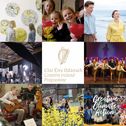
 Today, we talk about creativity—not as a luxury, but as a national strategy. Sheila Deegan is one of Ireland’s leading cultural architects. Over three decades, she’s shaped the artistic life of Limerick and helped reimagine the role of creativity in civic life. She now serves in the Creative Ireland Programme, a bold cross-government initiative that sees culture as a force for personal and national wellbeing. From children’s creative freedom to climate action, from local festivals to cross-border partnerships, Creative Ireland asks a radical question: what happens when a country places imagination at the heart of public policy? Sheila Deegan joins me now to talk about that question—about culture, community, the role of art in a divided world, and what it means to build something lasting through the machinery of government. "I left the local environment to pursue Creative Ireland because I really believe in this broader approach. Let's try not to silo things. Let’s try and get people working collaboratively for the benefit of everybody, not just one program over the other. I really hope that young people can hold a sense of social justice as we move forward into a very complicated world. They need to remember that we're all just people and that we all just need each other, whether that's creatively or within the landscape or within the economics." Episode Website www.creativeprocess.info/pod Instagram:@creativeprocesspodcast
Today, we talk about creativity—not as a luxury, but as a national strategy. Sheila Deegan is one of Ireland’s leading cultural architects. Over three decades, she’s shaped the artistic life of Limerick and helped reimagine the role of creativity in civic life. She now serves in the Creative Ireland Programme, a bold cross-government initiative that sees culture as a force for personal and national wellbeing. From children’s creative freedom to climate action, from local festivals to cross-border partnerships, Creative Ireland asks a radical question: what happens when a country places imagination at the heart of public policy? Sheila Deegan joins me now to talk about that question—about culture, community, the role of art in a divided world, and what it means to build something lasting through the machinery of government. "I left the local environment to pursue Creative Ireland because I really believe in this broader approach. Let's try not to silo things. Let’s try and get people working collaboratively for the benefit of everybody, not just one program over the other. I really hope that young people can hold a sense of social justice as we move forward into a very complicated world. They need to remember that we're all just people and that we all just need each other, whether that's creatively or within the landscape or within the economics." Episode Website www.creativeprocess.info/pod Instagram:@creativeprocesspodcast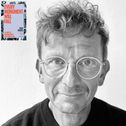
 “I work in between archeology and anthropology in this field called either historical archeology or contemporary archeology. At the heart of that is the relationship between objects and humans. How do we write about the past or the present in terms of listening to human voices or evidence from things where maybe human voices have been erased or haven't left as much of a mark on the written records as others? Wrapped up with that, though, is always the risk of dehumanization, of the treatment of human lives as if the boundary between a subject and an object is one that is permeable, not in a sort of positive way, but in a more sinister way. There is a long history of people being treated as things.” In this episode of Speaking Out of Place podcast Professor David Palumbo-Liu talks with Dan Hicks about the present’s responsibility to itself. How do not only monuments, but also the very idea of monumentality, serve to mystify and perpetuate beliefs that maintain social orders that deserve to be strenuously re-evaluated? Archaeologist and anthropologist Dan Hicks traces the development of a particularly virulent strain of monument-worship, that which emerges out of what he calls “militarist realism,” which harnesses technologies of war, particularly colonial, white supremacist war, to build institutions, disciplines, museums in its image in order to permanently maintain a border between those deemed human subjects and the object-worlds of the non-human—which includes racial others. Rather than grant the past immunity, Hicks argues that we need to decide for ourselves what we chose to remember, and what deserves to be forgotten. Dan Hicks is Professor of Contemporary Archaeology at Oxford University, Curator at the Pitt Rivers Museum, and a Fellow of St Cross College. He has written widely on art, heritage, museums, colonialism, and the material culture of the recent past and the near-present. Dan's books include The Brutish Museums: the Benin Bronzes, colonial violence and cultural restitution (Pluto 2020) and Every Monument Will Fall: a story of remembering and forgetting (Hutchinson Heinemann 2025). Bluesky/Insta: @ProfDanHicks www.palumbo-liu.com https://speakingoutofplace.com Bluesky @palumboliu.bsky.social Instagram @speaking_out_of_place
“I work in between archeology and anthropology in this field called either historical archeology or contemporary archeology. At the heart of that is the relationship between objects and humans. How do we write about the past or the present in terms of listening to human voices or evidence from things where maybe human voices have been erased or haven't left as much of a mark on the written records as others? Wrapped up with that, though, is always the risk of dehumanization, of the treatment of human lives as if the boundary between a subject and an object is one that is permeable, not in a sort of positive way, but in a more sinister way. There is a long history of people being treated as things.” In this episode of Speaking Out of Place podcast Professor David Palumbo-Liu talks with Dan Hicks about the present’s responsibility to itself. How do not only monuments, but also the very idea of monumentality, serve to mystify and perpetuate beliefs that maintain social orders that deserve to be strenuously re-evaluated? Archaeologist and anthropologist Dan Hicks traces the development of a particularly virulent strain of monument-worship, that which emerges out of what he calls “militarist realism,” which harnesses technologies of war, particularly colonial, white supremacist war, to build institutions, disciplines, museums in its image in order to permanently maintain a border between those deemed human subjects and the object-worlds of the non-human—which includes racial others. Rather than grant the past immunity, Hicks argues that we need to decide for ourselves what we chose to remember, and what deserves to be forgotten. Dan Hicks is Professor of Contemporary Archaeology at Oxford University, Curator at the Pitt Rivers Museum, and a Fellow of St Cross College. He has written widely on art, heritage, museums, colonialism, and the material culture of the recent past and the near-present. Dan's books include The Brutish Museums: the Benin Bronzes, colonial violence and cultural restitution (Pluto 2020) and Every Monument Will Fall: a story of remembering and forgetting (Hutchinson Heinemann 2025). Bluesky/Insta: @ProfDanHicks www.palumbo-liu.com https://speakingoutofplace.com Bluesky @palumboliu.bsky.social Instagram @speaking_out_of_place
 "For the last two decades, I've made over 20 films about the environment, starting with oil and carbon emissions. Those films, Kiss the Ground and now Common Ground, talk about how we can stabilize the climate, reverse climate change, grow nutrient-dense food, and help farmers make a profit through biodiversity and regenerative practices and principles. There's incredible intelligence in nature; it knows how to be resilient. We thought we could do it better, and in trying to mechanize and industrialize the entire system, we created a linear system that doesn’t make sense. We’re growing animals to produce food that we can’t eat so that we can ship it halfway around the world. It’s a system that doesn’t work. The way to heal, regenerate, stabilize the climate, and reverse climate change is literally one inch and one acre at a time—through communities waking up to the power of soil and biodiversity to sequester carbon for all of us. The oceans can’t handle any more carbon absorption; they’re acidifying and heating up. We need to take the carbon we’ve emitted and put it back into the soil. When we do that, we create thriving ecosystems, biodiversity, and water infiltration, which massively reduces the risks from flooding. It helps reverse desertification and staves off droughts by retaining water like a sponge. Resiliency comes from having genetic diversity rather than just one of everything." Today, we explore the work of a filmmaker whose lens is consistently turned toward the most critical issues facing our planet. Rebecca Tickell, in collaboration with her husband Josh Tickell, has created a powerful cinematic catalog of films that are not merely observations, but catalysts for change. They've taken on the complexities of our energy systems, the deep-seated problems within our food supply, and now, with her latest work, Bee: Wild, they explore the essential, fragile, and often unseen world of pollinators. Their film Kiss the Ground sparked a global conversation about regenerative agriculture, leading to tangible shifts in policy and public understanding. Common Ground continued this exploration, unraveling the intricate web of our food systems. Now, with Bee: Wild, narrated by Ellie Goulding and executive produced by Angelina Jolie,Rebecca brings her characteristic blend of journalistic rigor, personal narrative, and solutions-driven storytelling to the urgent plight of bees, asking us to reconsider our relationship with the natural world. Episode Website www.creativeprocess.info/pod Instagram:@creativeprocesspodcast
"For the last two decades, I've made over 20 films about the environment, starting with oil and carbon emissions. Those films, Kiss the Ground and now Common Ground, talk about how we can stabilize the climate, reverse climate change, grow nutrient-dense food, and help farmers make a profit through biodiversity and regenerative practices and principles. There's incredible intelligence in nature; it knows how to be resilient. We thought we could do it better, and in trying to mechanize and industrialize the entire system, we created a linear system that doesn’t make sense. We’re growing animals to produce food that we can’t eat so that we can ship it halfway around the world. It’s a system that doesn’t work. The way to heal, regenerate, stabilize the climate, and reverse climate change is literally one inch and one acre at a time—through communities waking up to the power of soil and biodiversity to sequester carbon for all of us. The oceans can’t handle any more carbon absorption; they’re acidifying and heating up. We need to take the carbon we’ve emitted and put it back into the soil. When we do that, we create thriving ecosystems, biodiversity, and water infiltration, which massively reduces the risks from flooding. It helps reverse desertification and staves off droughts by retaining water like a sponge. Resiliency comes from having genetic diversity rather than just one of everything." Today, we explore the work of a filmmaker whose lens is consistently turned toward the most critical issues facing our planet. Rebecca Tickell, in collaboration with her husband Josh Tickell, has created a powerful cinematic catalog of films that are not merely observations, but catalysts for change. They've taken on the complexities of our energy systems, the deep-seated problems within our food supply, and now, with her latest work, Bee: Wild, they explore the essential, fragile, and often unseen world of pollinators. Their film Kiss the Ground sparked a global conversation about regenerative agriculture, leading to tangible shifts in policy and public understanding. Common Ground continued this exploration, unraveling the intricate web of our food systems. Now, with Bee: Wild, narrated by Ellie Goulding and executive produced by Angelina Jolie,Rebecca brings her characteristic blend of journalistic rigor, personal narrative, and solutions-driven storytelling to the urgent plight of bees, asking us to reconsider our relationship with the natural world. Episode Website www.creativeprocess.info/pod Instagram:@creativeprocesspodcast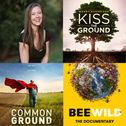
 “I didn't really appreciate bees until I became a farmer, and then I started to understand how essential bees are for our food. They pollinate 70% of our food, and that feeds 90% of the world. There's a whole world of insects that creates the color in our food; it's what creates the flavor in our food. It's part of our biodiversity, and it's essential for human life on Earth to protect and understand how to protect these bees and pollinators. Soil has the power, through photosynthesis, to draw down carbon from the atmosphere. It's called biosequestration. It takes that carbon down into the roots, and then it turns it into healthy humus. That is the food for life in the soil. It needs that carbon. And so that is the purpose of plants. They breathe in the carbon and breathe out the oxygen. We've forgotten that simple tool of the solution that's right beneath our feet called soil health and soil regeneration. Not only does it draw down carbon, it's the only place we can put that teraton of carbon that we've emitted. There's only one place for it, and it's in the soil. So why isn't that the main conversation of every climate conversation? You not only bring the soil back to life, but you are creating nutrient-dense food. You're giving plants the ability to work in symbiosis with the soil that it co-evolved with. That then allows for it not only to be resilient and have a strong immune system, but also to absorb nutrition, which, in turn, we eat and absorb that nutrition. We're a reflection of the soil." Today, we explore the work of a filmmaker whose lens is consistently turned toward the most critical issues facing our planet. Rebecca Tickell, in collaboration with her husband Josh Tickell, has created a powerful cinematic catalog of films that are not merely observations, but catalysts for change. They've taken on the complexities of our energy systems, the deep-seated problems within our food supply, and now, with her latest work, Bee: Wild, they explore the essential, fragile, and often unseen world of pollinators. Their film Kiss the Ground sparked a global conversation about regenerative agriculture, leading to tangible shifts in policy and public understanding. Common Ground continued this exploration, unraveling the intricate web of our food systems. Now, with Bee: Wild, narrated by Ellie Goulding and executive produced by Angelina Jolie,Rebecca brings her characteristic blend of journalistic rigor, personal narrative, and solutions-driven storytelling to the urgent plight of bees, asking us to reconsider our relationship with the natural world. Episode Website www.creativeprocess.info/pod Instagram:@creativeprocesspodcast
“I didn't really appreciate bees until I became a farmer, and then I started to understand how essential bees are for our food. They pollinate 70% of our food, and that feeds 90% of the world. There's a whole world of insects that creates the color in our food; it's what creates the flavor in our food. It's part of our biodiversity, and it's essential for human life on Earth to protect and understand how to protect these bees and pollinators. Soil has the power, through photosynthesis, to draw down carbon from the atmosphere. It's called biosequestration. It takes that carbon down into the roots, and then it turns it into healthy humus. That is the food for life in the soil. It needs that carbon. And so that is the purpose of plants. They breathe in the carbon and breathe out the oxygen. We've forgotten that simple tool of the solution that's right beneath our feet called soil health and soil regeneration. Not only does it draw down carbon, it's the only place we can put that teraton of carbon that we've emitted. There's only one place for it, and it's in the soil. So why isn't that the main conversation of every climate conversation? You not only bring the soil back to life, but you are creating nutrient-dense food. You're giving plants the ability to work in symbiosis with the soil that it co-evolved with. That then allows for it not only to be resilient and have a strong immune system, but also to absorb nutrition, which, in turn, we eat and absorb that nutrition. We're a reflection of the soil." Today, we explore the work of a filmmaker whose lens is consistently turned toward the most critical issues facing our planet. Rebecca Tickell, in collaboration with her husband Josh Tickell, has created a powerful cinematic catalog of films that are not merely observations, but catalysts for change. They've taken on the complexities of our energy systems, the deep-seated problems within our food supply, and now, with her latest work, Bee: Wild, they explore the essential, fragile, and often unseen world of pollinators. Their film Kiss the Ground sparked a global conversation about regenerative agriculture, leading to tangible shifts in policy and public understanding. Common Ground continued this exploration, unraveling the intricate web of our food systems. Now, with Bee: Wild, narrated by Ellie Goulding and executive produced by Angelina Jolie,Rebecca brings her characteristic blend of journalistic rigor, personal narrative, and solutions-driven storytelling to the urgent plight of bees, asking us to reconsider our relationship with the natural world. Episode Website www.creativeprocess.info/pod Instagram:@creativeprocesspodcast
 “If we look at the entire history of the human experience, if you saw some text or you heard some spoken language, you could 100 percent reliably infer that there was a human who created that. Our experience of having that text or that image generated for us is very akin to the experience of a magic trick, and we sort of pre-subconsciously want to attribute some kind of intelligence to what's going on on the other side. At the core of the work is that sense of curiosity, that sense of joy, that sense of beauty, and that sense of learning. I've been fortunate to have all kinds of strange and interesting experiences, whether that's seeing weird things in the sky over secret military bases in the middle of the Nevada desert, going scuba diving and finding internet cables on the bottom of the ocean, or tracking spy satellites in the sky and being able to predict when they'll appear in a flash against the backdrop of stars. The world around us is extraordinary and embodied, right? It is not on screens, and I’m very privileged to have that be so much a part of my process.” Trevor Paglen is an artist whose work makes the invisible visible, whether he's photographing secret government sites from miles away or revealing the hidden infrastructures of mass surveillance. He's a geographer by training, and he combines investigative journalism with his art practice to explore the hidden power structures of our time, including military technology and artificial intelligence. His work has been exhibited in major museums around the world, and he's also an award-winning author. His exhibitions, like 'The Black Sites' and 'Limit Tele-photography,’ have earned him critical acclaim, including a MacArthur Fellowship. He's recently opened a new exhibition at Pace Gallery in New York called Cardinals (Jun 26–Aug 15) which delves into the intriguing connections between UFO sightings, AI, and the spread of disinformation. Episode Website www.creativeprocess.info/pod Instagram:@creativeprocesspodcast
“If we look at the entire history of the human experience, if you saw some text or you heard some spoken language, you could 100 percent reliably infer that there was a human who created that. Our experience of having that text or that image generated for us is very akin to the experience of a magic trick, and we sort of pre-subconsciously want to attribute some kind of intelligence to what's going on on the other side. At the core of the work is that sense of curiosity, that sense of joy, that sense of beauty, and that sense of learning. I've been fortunate to have all kinds of strange and interesting experiences, whether that's seeing weird things in the sky over secret military bases in the middle of the Nevada desert, going scuba diving and finding internet cables on the bottom of the ocean, or tracking spy satellites in the sky and being able to predict when they'll appear in a flash against the backdrop of stars. The world around us is extraordinary and embodied, right? It is not on screens, and I’m very privileged to have that be so much a part of my process.” Trevor Paglen is an artist whose work makes the invisible visible, whether he's photographing secret government sites from miles away or revealing the hidden infrastructures of mass surveillance. He's a geographer by training, and he combines investigative journalism with his art practice to explore the hidden power structures of our time, including military technology and artificial intelligence. His work has been exhibited in major museums around the world, and he's also an award-winning author. His exhibitions, like 'The Black Sites' and 'Limit Tele-photography,’ have earned him critical acclaim, including a MacArthur Fellowship. He's recently opened a new exhibition at Pace Gallery in New York called Cardinals (Jun 26–Aug 15) which delves into the intriguing connections between UFO sightings, AI, and the spread of disinformation. Episode Website www.creativeprocess.info/pod Instagram:@creativeprocesspodcast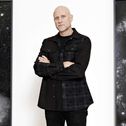
 “There's a word for this brain rot, right? I think that's very real. There are studies coming out now that are showing that the more and more of our cognitive labor we offload to AI systems, the less creative we become, the less critical we become, and the less of our human faculties for reason we use. There's something sad about that, but there’s also something dangerous about it because that leaves us very open to being manipulated. The surveillance capitalism kind of economy of extracting data from every possible moment of everyday life in order to extract value. The sensor systems that we're surrounded with are not simply passive devices that are recording us; they are increasingly becoming active sculptors of our experience of reality. Playing dirty. I’m trying to think about these other media strategies, whether that's UFO photography, psychological operations, magic, or neuroscience, and take them seriously as contributing factors to the changing visual culture. With the collection at Pace Gallery, (New York, Jun 26–Aug 15) it was really just to put those images together and show them. They’re all photographed on film. A lot of them are photographed on instant film. They’re not images that are made with AI; they're not images that are photoshopped. What I really wanted to get at was thinking about the ways in which what we see in an image is very often what we're predisposed to see. I am playing with these mechanics of perception and proposing that as a way of thinking about images now. At the core of the work is that sense of curiosity, that sense of joy, that sense of beauty, and that sense of learning. I've been fortunate to have all kinds of strange and interesting experiences, whether that's seeing weird things in the sky over secret military bases in the middle of the Nevada desert, going scuba diving and finding internet cables on the bottom of the ocean, or tracking spy satellites in the sky and being able to predict when they'll appear in a flash against the backdrop of stars. The world around us is extraordinary and embodied, right? It is not on screens, and I’m very privileged to have that be so much a part of my process.” Trevor Paglen is an artist whose work makes the invisible visible, whether he's photographing secret government sites from miles away or revealing the hidden infrastructures of mass surveillance. He's a geographer by training, and he combines investigative journalism with his art practice to explore the hidden power structures of our time, including military technology and artificial intelligence. His work has been exhibited in major museums around the world, and he's also an award-winning author. His exhibitions, like 'The Black Sites' and 'Limit Tele-photography,’ have earned him critical acclaim, including a MacArthur Fellowship. He's recently opened a new exhibition at Pace Gallery in New York called Cardinals, which delves into the intriguing connections between UFO sightings, AI, and the spread of disinformation. Episode Website www.creativeprocess.info/pod Instagram:@creativeprocesspodcast
“There's a word for this brain rot, right? I think that's very real. There are studies coming out now that are showing that the more and more of our cognitive labor we offload to AI systems, the less creative we become, the less critical we become, and the less of our human faculties for reason we use. There's something sad about that, but there’s also something dangerous about it because that leaves us very open to being manipulated. The surveillance capitalism kind of economy of extracting data from every possible moment of everyday life in order to extract value. The sensor systems that we're surrounded with are not simply passive devices that are recording us; they are increasingly becoming active sculptors of our experience of reality. Playing dirty. I’m trying to think about these other media strategies, whether that's UFO photography, psychological operations, magic, or neuroscience, and take them seriously as contributing factors to the changing visual culture. With the collection at Pace Gallery, (New York, Jun 26–Aug 15) it was really just to put those images together and show them. They’re all photographed on film. A lot of them are photographed on instant film. They’re not images that are made with AI; they're not images that are photoshopped. What I really wanted to get at was thinking about the ways in which what we see in an image is very often what we're predisposed to see. I am playing with these mechanics of perception and proposing that as a way of thinking about images now. At the core of the work is that sense of curiosity, that sense of joy, that sense of beauty, and that sense of learning. I've been fortunate to have all kinds of strange and interesting experiences, whether that's seeing weird things in the sky over secret military bases in the middle of the Nevada desert, going scuba diving and finding internet cables on the bottom of the ocean, or tracking spy satellites in the sky and being able to predict when they'll appear in a flash against the backdrop of stars. The world around us is extraordinary and embodied, right? It is not on screens, and I’m very privileged to have that be so much a part of my process.” Trevor Paglen is an artist whose work makes the invisible visible, whether he's photographing secret government sites from miles away or revealing the hidden infrastructures of mass surveillance. He's a geographer by training, and he combines investigative journalism with his art practice to explore the hidden power structures of our time, including military technology and artificial intelligence. His work has been exhibited in major museums around the world, and he's also an award-winning author. His exhibitions, like 'The Black Sites' and 'Limit Tele-photography,’ have earned him critical acclaim, including a MacArthur Fellowship. He's recently opened a new exhibition at Pace Gallery in New York called Cardinals, which delves into the intriguing connections between UFO sightings, AI, and the spread of disinformation. Episode Website www.creativeprocess.info/pod Instagram:@creativeprocesspodcast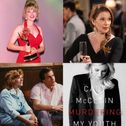
 “I had to become the father of my family very young because my parents divorced when I was 12. My situation was a little bit unusual in that my father kind of disappeared, and I had been making a fair amount of money as a kid, doing commercials and television and film. We needed money, and I kind of became the breadwinner. But I had this amazing world that I had access to, which was the world of the entertainment industry. My mom was supportive of my taking over and saying, "This is, I think, what we need to do." She liked the idea of moving to New York, so we moved to New York when I was 17 with a play that I had gotten. Then she got cancer and became really sick, so I had to take care of her full time. That lasted for about eight years, and then she died when I was 25. That was a rough go. At the same time, I had an amazing other world, and my other world was the world of make-believe and pretend, which I got to participate in on the soaps, with happy families and Christmases, Easters, miracles, love, weddings, and children. The pretend world that I spent a large amount of time in became a great way to balance what was sort of tragic in my real life.” Our guest today is Cady McClain. You probably know her from her long and celebrated career in daytime television. She is a three-time Emmy® Award-winning actress. She plays Pamela Curtis on CBS’ Beyond the Gates, and is the Artistic Director of Axial Theatre, and her directorial work includes the documentary, Seeing is Believing: Women Direct, a fascinating look at the challenges and triumphs of women behind the camera. Her memoir, Murdering My Youth, is an honest and sometimes difficult book about growing up as a child actor in the spotlight. Her work across all these different art forms—acting, directing, writing, art, and music—all seems to be connected by a commitment to telling true stories, no matter how complicated. www.creativeprocess.info/pod Instagram:@creativeprocesspodcast
“I had to become the father of my family very young because my parents divorced when I was 12. My situation was a little bit unusual in that my father kind of disappeared, and I had been making a fair amount of money as a kid, doing commercials and television and film. We needed money, and I kind of became the breadwinner. But I had this amazing world that I had access to, which was the world of the entertainment industry. My mom was supportive of my taking over and saying, "This is, I think, what we need to do." She liked the idea of moving to New York, so we moved to New York when I was 17 with a play that I had gotten. Then she got cancer and became really sick, so I had to take care of her full time. That lasted for about eight years, and then she died when I was 25. That was a rough go. At the same time, I had an amazing other world, and my other world was the world of make-believe and pretend, which I got to participate in on the soaps, with happy families and Christmases, Easters, miracles, love, weddings, and children. The pretend world that I spent a large amount of time in became a great way to balance what was sort of tragic in my real life.” Our guest today is Cady McClain. You probably know her from her long and celebrated career in daytime television. She is a three-time Emmy® Award-winning actress. She plays Pamela Curtis on CBS’ Beyond the Gates, and is the Artistic Director of Axial Theatre, and her directorial work includes the documentary, Seeing is Believing: Women Direct, a fascinating look at the challenges and triumphs of women behind the camera. Her memoir, Murdering My Youth, is an honest and sometimes difficult book about growing up as a child actor in the spotlight. Her work across all these different art forms—acting, directing, writing, art, and music—all seems to be connected by a commitment to telling true stories, no matter how complicated. www.creativeprocess.info/pod Instagram:@creativeprocesspodcast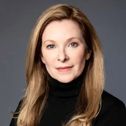
 “I won my first Emmy when I was 21, which was the result of absolutely devoting myself day and night for two years to doing all the scene work. I attended classes simultaneously and did plays until my mother died. I studied with Michael Howard for eight years. Even when I was so tired I couldn't get up to do a scene, he would say, "Get up and do a poem." It helped me enormously; it saved me. The way I was trained and how I train others is that you know when you’re in the zone. Oh God, it feels so good. It feels like flying. And that's what you want. You want to be so unselfaware that you're on liftoff? I had to become the father of my family very young because my parents divorced when I was 12. My situation was a little bit unusual in that my father kind of disappeared, and I had been making a fair amount of money as a kid, doing commercials and television and film. We needed money, and I kind of became the breadwinner. But I had this amazing world that I had access to, which was the world of the entertainment industry. My mom was supportive of my taking over and saying, "This is, I think, what we need to do." She liked the idea of moving to New York, so we moved to New York when I was 17 with a play that I had gotten. Then she got cancer and became really sick, so I had to take care of her full time. That lasted for about eight years, and then she died when I was 25. That was a rough go. At the same time, I had an amazing other world, and my other world was the world of make-believe and pretend, which I got to participate in on the soaps, with happy families and Christmases, Easters, miracles, love, weddings, and children. The pretend world that I spent a large amount of time in became a great way to balance what was sort of tragic in my real life.” Our guest today is Cady McClain. You probably know her from her long and celebrated career in daytime television. She is a three-time Emmy® Award-winning actress. She plays Pamela Curtis on CBS’ Beyond the Gates, and is the Artistic Director of Axial Theatre, and her directorial work includes the documentary, Seeing is Believing: Women Direct, a fascinating look at the challenges and triumphs of women behind the camera. Her memoir, Murdering My Youth, is an honest and sometimes difficult book about growing up as a child actor in the spotlight. Her work across all these different art forms—acting, directing, writing, art, and music—all seems to be connected by a commitment to telling true stories, no matter how complicated. Episode Website www.creativeprocess.info/pod Instagram:@creativeprocesspodcast
“I won my first Emmy when I was 21, which was the result of absolutely devoting myself day and night for two years to doing all the scene work. I attended classes simultaneously and did plays until my mother died. I studied with Michael Howard for eight years. Even when I was so tired I couldn't get up to do a scene, he would say, "Get up and do a poem." It helped me enormously; it saved me. The way I was trained and how I train others is that you know when you’re in the zone. Oh God, it feels so good. It feels like flying. And that's what you want. You want to be so unselfaware that you're on liftoff? I had to become the father of my family very young because my parents divorced when I was 12. My situation was a little bit unusual in that my father kind of disappeared, and I had been making a fair amount of money as a kid, doing commercials and television and film. We needed money, and I kind of became the breadwinner. But I had this amazing world that I had access to, which was the world of the entertainment industry. My mom was supportive of my taking over and saying, "This is, I think, what we need to do." She liked the idea of moving to New York, so we moved to New York when I was 17 with a play that I had gotten. Then she got cancer and became really sick, so I had to take care of her full time. That lasted for about eight years, and then she died when I was 25. That was a rough go. At the same time, I had an amazing other world, and my other world was the world of make-believe and pretend, which I got to participate in on the soaps, with happy families and Christmases, Easters, miracles, love, weddings, and children. The pretend world that I spent a large amount of time in became a great way to balance what was sort of tragic in my real life.” Our guest today is Cady McClain. You probably know her from her long and celebrated career in daytime television. She is a three-time Emmy® Award-winning actress. She plays Pamela Curtis on CBS’ Beyond the Gates, and is the Artistic Director of Axial Theatre, and her directorial work includes the documentary, Seeing is Believing: Women Direct, a fascinating look at the challenges and triumphs of women behind the camera. Her memoir, Murdering My Youth, is an honest and sometimes difficult book about growing up as a child actor in the spotlight. Her work across all these different art forms—acting, directing, writing, art, and music—all seems to be connected by a commitment to telling true stories, no matter how complicated. Episode Website www.creativeprocess.info/pod Instagram:@creativeprocesspodcast
 “We're living in a fascinating time, and unfortunately, to an extent, Europe and, very much so, North America are trying to hold onto the past while other parts of the world, like China, Taiwan, Korea, and Japan, are looking to the future. As an Italian citizen and an English citizen, I feel that we’ve left ourselves behind and that others are taking leaps forward. This isn't just about climate science; it’s about big geopolitics. It's about who wins the power battle over the dominant economy, economic thinking, and currencies. Do we have a reserve currency in the petrodollar? All these things are now being questioned in 2025. We're in an extraordinary period of history.” For decades, the conversation around climate change often felt abstract, a distant threat. But what happens when that threat collides with the very concrete world of finance, with investments, and with the bottom line? Mark Campanale has been at the forefront of this critical intersection for over two decades. He's a veteran of sustainable finance, having helped launch some of the earliest responsible investment funds. But it's his work with the Carbon Tracker Initiative that has truly reshaped how we understand the economic risks of a fossil fuel-dependent future. Carbon Tracker, an independent financial think tank, introduced concepts like the "carbon bubble" and "stranded assets"—terms that have not only become central to the divestment movement but are now indispensable for investors and regulators trying to navigate the path to decarbonization. Mark Campanale and the Carbon Tracker Initiative have made it impossible to ignore the financial implications of a warming planet. Episode Website www.creativeprocess.info/pod Instagram:@creativeprocesspodcast
“We're living in a fascinating time, and unfortunately, to an extent, Europe and, very much so, North America are trying to hold onto the past while other parts of the world, like China, Taiwan, Korea, and Japan, are looking to the future. As an Italian citizen and an English citizen, I feel that we’ve left ourselves behind and that others are taking leaps forward. This isn't just about climate science; it’s about big geopolitics. It's about who wins the power battle over the dominant economy, economic thinking, and currencies. Do we have a reserve currency in the petrodollar? All these things are now being questioned in 2025. We're in an extraordinary period of history.” For decades, the conversation around climate change often felt abstract, a distant threat. But what happens when that threat collides with the very concrete world of finance, with investments, and with the bottom line? Mark Campanale has been at the forefront of this critical intersection for over two decades. He's a veteran of sustainable finance, having helped launch some of the earliest responsible investment funds. But it's his work with the Carbon Tracker Initiative that has truly reshaped how we understand the economic risks of a fossil fuel-dependent future. Carbon Tracker, an independent financial think tank, introduced concepts like the "carbon bubble" and "stranded assets"—terms that have not only become central to the divestment movement but are now indispensable for investors and regulators trying to navigate the path to decarbonization. Mark Campanale and the Carbon Tracker Initiative have made it impossible to ignore the financial implications of a warming planet. Episode Website www.creativeprocess.info/pod Instagram:@creativeprocesspodcast